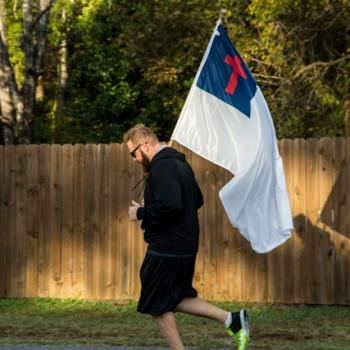How can we know God’s will? A non-religious person might say that we can’t know God’s will, or even if there is a God. But, a Christian would say that we can know God’s will because He has revealed it to us. Christian theologians have always taught that God’s will is found throughout the Bible, but that it is clearly articulated in the Ten Commandments in Exodus 20. Those 10 Commandments are the basis not only for the rest of the law of Moses found in Exodus, Leviticus, Numbers, and Deuteronomy, but also for the commands and exhortations found throughout the rest of Scripture.
Starting points are always important, and the 10 Commandments don’t start with, “You shall have no other gods before me.” They start with the words, “I am the Lord your God who brought you out of Egypt, out of the land of slavery.” We call this the Prologue to the 10 Commandments. Most people skip over it. But, it is vitally important, because if we don’t include it, we end up with a set of rules divorced from a relationship, all law and no gospel. If all we have is the law, we have no hope; the Prologue tells us about our hope.
There are 3 things that the Prologue tells us: that the God of the law is a personal God, a freeing God, and a providential God.
God is a personal God.
God reminds His people, “I am the Lord your God.” It’s funny how often God re-introduces Himself to His people. It’s not like they’ve forgotten. Sometimes I forget I’ve met people at church and end up introducing myself 3-4 times. But it would be pretty hard to forget meeting God when He’s speaking from heaven or in a burning bush. Just like all of us who are over 20 years old remember exactly where we were when 9/11 happened, so people remember when they first meet God.
But God has a purpose in reminding the people who He is. His purpose is to give the law here the personal grounding it needs. You see, all morality that is impersonal loses its power to motivate. Because it’s just words; of course, there are ideas behind the words, but whose ideas? At the end of the day, law comes down to the issue of authority.
Every 2 year-old learns two words very quickly: ‘No’ and ‘Why.’ They love to ask “Why?” Sit still! Why? Eat your dinner. Why? Because I want you to be healthy. Why? Because I love you. Why? You can give reasons for your commands, but at the end of the day, when they keep asking why, it comes down to, “Because I said so.”
Judeo-Christian morality doesn’t hinge on an arbitrary set of rules, it has an ultimate authority. And that authority is personal- a God who is not only our Lord, but our Father who loves us. Why should I be a good person? Someone might say, ‘Because life will be better for you’ or ‘Because you have a vague moral obligation to do good to others.’ The Christian says, ‘Because God.’ There are lots of proximate reasons, but ultimately: be a good person because God has created you for goodness.
God is a freeing God.
The second half of the Prologue is very specific about what Israel’s God has done: “[I am the Lord your God] who brought you out of the land of Egypt, out of the house of slavery.” The law starts with freedom. The background of the 10 commandments is slavery in Egypt. The people that God is delivering these tablets of the law to had been slaves in Egypt for 400 years. Think about that a moment. Slavery is fundamentally inhumane treatment, it robs people of their dignity and honor. When the Hebrews went to work making bricks and building the pyramids and buildings in Egypt, they were given no choice, their life was that of a pack mule: work and rest, work and rest. That’s no way to live.
But these slaves cried out to God for 400 years to deliver them. And He heard their cries, and finally in His wisdom and providence He sent a man named Moses to deliver them.
The order of the prologue and the 10 Commandments is the same order we see throughout all of Scripture: first the gospel, then the law. Theologians talk about this by saying that ‘the indicative always comes before the imperative.’ The indicative is a person’s state or status, who they are, what is. The imperative is what we ought to do. The indicative- who we are- always comes before the imperative- what we do.
In other words, we don’t keep the rules and do our work in order to be saved- we are saved and then we learn how to live as God would have us live. In the Bible, our status/identity is secure, apart from our works.
You see this in basically all of Paul’s letters in the New Testament. He spends a lot of time at the beginning of books like Ephesians and Philippians reminding the Christians he is writing to that they are saved and secure in Christ, and then about halfway through he says, “Therefore…” And he begins to talk about how they should behave since they belong to God.
That order is critically important. If you don’t get it right, you end up either giving yourself credit for your salvation, or you end up in despair once you realize you can never keep the law. Healthy Christian living always goes back to your identity in God. When you sin, you don’t end in despair because you go back to the fact that you are a child of God and are forgiven. When you do good, you don’t end in pride because you realize that the only reason you’ve done good is because God has saved you and changed your heart.
A lot of people think, ‘In the Old Testament, you were saved by keeping the law, but in the New Testament, you are saved by faith.’ But, the Prologue cries out, ‘NO! You were never saved by keeping the Law.’ God has always intended, even back before the beginning of time, to save His people by grace, and then have them live based on that grace.
Now, there’s been a fairly big fight the last decade or so over the posting of the 10 Commandments in public places like courthouses, schools and government buildings. And I’m all for us learning from Scripture key principles for government and education. But, here’s my problem: they never post the Prologue. They sometimes put “I am the Lord Thy God” and then jump into the 1st Commandment. But they always leave out “who brought you out of the land of Egypt, out of the house of slavery.” That gets edited.
But, the law without the gospel is death! If we post the 10 Commandments without the Prologue, what was intended to be a living covenantal relationship becomes nothing more than moralism- do this, do that. And moralism ultimately leads to death.
Context. It’s so important for understanding God’s words. But what about our context? You might say, “I’ve never lived in Egypt. I’ve never been a slave in need of rescue. So how can the 10 Commandments apply to me?”
Not so fast. In Ephesians 2:1-3, the Apostle Paul describes us before we came into a relationship with God: “And you were dead in the trespasses and sins in which you once walked, following the course of this world, following the prince of the power of the air, the spirit that is now at work in the sons of disobedience- among whom we all once lived in the passions of our flesh, carrying out the desires of the body and the mind, and were by nature children of wrath, like the rest of mankind.”
Do you know what that is describing? Slavery. In our natural state, we were slaves to our sinful passions, to the prince of this world, to the rebellious ways of this world. You and I were slaves in need of a deliverer like Moses. And the New Testament gives a lot of clues that a new Moses has come.
When Moses was a baby, a king tried to kill him and killed all the other Hebrew boys under two years of age; when Jesus was a baby, a king tried to kill him, too, and killed all the Hebrew boys under two. Moses spent 40 years in the wilderness preparing to do his work; Jesus spent 40 days in the wilderness preparing to do the work that God had called Him to do. Moses was given the law for his people on a mountain; Jesus taught the full extent of the law to His people on a mountain. Moses prayed for the people to have bread and God sent bread from heaven; Jesus prayed for the people in His day to have bread and God multiplied the bread to feed the people.
It’s no accident that the meal that Jesus ate with His disciples on His last night with them was the Passover meal- to remember the exodus out of Egypt. And Jesus did something which would have been shocking- He took a cup of wine, which represented the slain lamb’s blood and said, ‘This cup is the new covenant in my blood.’ In other words, Jesus was saying that He was going to be slain so that His people could be free.
That’s the ultimate freedom that the words in the Prologue point to. It was a temporary freedom that God gave Israel when He brought them out of slavery in Egypt, because they would be conquered again. The freedom that Jesus gives is a permanent freedom from death and hell. His death paid the penalty for your sins. And so, in Jesus, you no longer are a slave to your sinful nature. You no longer have to fear death.
God is a providential God
The third thing we learn from the Prologue about God is that He is a providential God. God tells His people: “I brought you out of Egypt.”
But what do they keep saying to Him in the wilderness? ‘You brought us out here to die, to abandon us!’ But, of course we know that He did not. What God started, He’s going to finish. It might not be clear in the Prologue, but God makes this clear in the 4th Commandment: “Honor your father and mother, that your days may be long in the land that the Lord your God is giving you.”
God wasn’t just taking them out of the house of slavery, He was giving them a new home. Dillard and Longman, in their Introduction to the Old Testament put it so well, “The greatest act of salvation history in the Old Testament was not the Exodus alone. The Exodus was just one half of a great redemptive complex. God had not promised his people only that he would redeem them from bondage, but also that he would give them the land he promised to the fathers as their inheritance.”
In other words, the Israelites had been saved, but they were still being saved. And God is telling them that He will finish the work. That’s what providence is- the idea that God is working in every area of your life and is working all things according to the counsel of His will.
Have you ever heard that phrase, “It’s a God thing!” People say that in Oklahoma when good things happen to them. When someone close to you gets healed, or you get offered a new job the day before you were going to quit your old one, or you get a parking spot by the door, you say, “It’s a God thing.” But we don’t say that when bad things happen, when we don’t get the new job, when our loved one doesn’t get healed.
But the point of providence is that everything is a God thing! God is in the good and the bad. He doesn’t cause evil, but He works in and through it. He is working all things together for good for those who love Him and are called according to His purposes.
The problem is that we think that we’re saved, but then after that initial salvation we think that we’re on our own. We’re saved by the power of God, by grace through faith alone, but after that it’s our job to work in our own power, through gritting our teeth through willpower alone. We fall into Saving Private Ryan salvation, where Private Ryan is saved through the sacrifice of a company of men and one of those dying men says with his last breath, “Earn this.”
David Ireland was diagnosed with a neurological disease that put him in a wheelchair as a teenager, but he was still able to go to college and even get married. When his wife got pregnant with their first child, he didn’t know if he was going to live to see the child, so he wrote a book called Letters to an Unborn Child. In it he writes:
“This is the kind of woman your mother is. When we go on a date, she puts me in the bathtub, she brushes my teeth, she dresses me, she puts me in my wheelchair, she puts the pedestals on the chair so I can rest my legs. She pushes me down the steps, out to the car. She pulls me out of the wheelchair, she puts me into the car, she closes the door. She puts my wheelchair in the trunk, she closes the trunk and raises the garage door [back in the 60’s when garage doors were manual]. She backs out of the garage, she pulls the garage door back down, she drives me to the restaurant.
She gets to the restaurant, she goes to the trunk, she gets the wheelchair out of the trunk, she pulls it up to the side of the car, she puts me in the wheelchair. She closes the door, she closes the trunk. She pushes me into the restaurant, she pushes me up to the table, she puts me in a chair at the table, so I’ll be more comfortable and people won’t be as prone to stare. She feeds me, she wipes my chin, she pays for the meal.
She puts me back in the wheelchair, she pushes me back out to the car, she puts me in the car, she puts the wheelchair back in the trunk, she drives us home. She raises the garage door, pulls into the garage, she takes the wheelchair out of the trunk, she puts me in the chair. She closes the trunk, closes the garage door. She takes my clothes off, puts me in my pajamas, brushes my teeth. She puts me in the bed, kisses me on the cheek and says, ‘Thank you for taking me out to dinner.’”
That’s the gospel. That’s union with Christ, what being in a relationship with Jesus is all about. God gives you a new heart, and He gives you the power to believe. And then He gives you the power to obey Him, and He gives you the ability to love others unselfishly. And He walks with you, in you and behind and before you all the way home- through every trial and every valley.
That’s what the Prologue teaches us. We’re not alone, we’re never alone. The law of God is not about how to earn our way to Him, but how to walk with Him as new creations in Christ.













